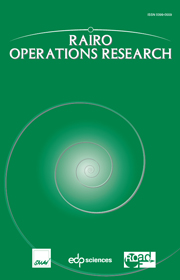No CrossRef data available.
Article contents
Scheduling in the presence of processor networks : complexity and approximation
Published online by Cambridge University Press: 04 May 2012
Abstract
In this paper, we study the problem of makespan minimization for the multiprocessor scheduling problem in the presence of communication delays. The communication delay between two tasks i and j depends on the distance between the two processors on which these two tasks are executed. Lahlou shows that a simple polynomial-time algorithm exists when the length of the schedule is at most two (the problem becomes 𝒩𝒫-complete when the length of the schedule is at most three). We prove that there is no polynomial-time algorithm with a performance guarantee of less than 4/3 (unless 𝒫 = 𝒩𝒫) to minimize the makespan when the network topology is a chain or ring and the precedence graph is a bipartite graph of depth one. We also develop two polynomial-time approximation algorithms with constant ratio dedicated to cases where the processor network admits a limited or unlimited number of processors.
- Type
- Research Article
- Information
- Copyright
- © EDP Sciences, ROADEF, SMAI, 2012


